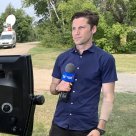Jason Childs said the Saskatchewan 2021-22 provincial budget, due Tuesday, will be a “steady as she goes” document designed to avoid financial and political risk.

“I think we’re poorly situated to take big leaps right now,” Childs said, speaking over Zoom from Rouleau, Sask.
“We’re likely to get something that resembles a budget that may have some fuzziness around implementation timelines.”
Childs, an economics professor at the University of Regina, said the governing Saskatchewan Party won’t depart from what’s already yielded economic and electoral success. He referenced Saskatchewan’s projected deficit of $2 billion, according to a financial update last year, and the October election, which returned the Sask. Party to power.
That deficit is paltry compared to those of larger provinces. Childs said low inflation rates and strong prices for natural resources are helping the province get by, but said the government can’t count on those things holding steady.
The government, he said, must first get through the pandemic before making any large moves.
“With Saskatchewan moving towards really stringent lockdowns with Regina, Moose Jaw and other places,” he said, “we’re in a place where we’re going to take another hit.”
- Retired Quebec teacher buys winning lottery ticket at last minute, wins $40M
- N.B. election: Higgs went to ‘very dark place’ with Liberal joke, opponent says
- NDP want competition watchdog to probe potential rent-fixing by landlords
- Jasper mayor says CN Rail relocation will be devastating: ‘Deeply disappointed’
Regina is currently the provincial COVID-19 hotspot, with around four times as many cases as the next most infected area, Saskatoon. The government imposed strict public health guidelines and has asked residents in Moose Jaw and the surrounding area to abide by the same restrictions, but hasn’t made them mandatory yet.
He said the province will likely focus on healthcare, especially mental health and intensive care unit capacity, and infrastructure.

Get daily National news
That’s a boon to Jason Mercredi, the executive director of Prairie Harm Reduction (PHR).
Mercredi runs the only supervised consumption site in the province, where clients can use drugs under the watchful eye of trained staff who are nearby to help if the user begins to overdose.
Saskatchewan is also in the midst of a mental health and addictions crisis.
More than 420 people have died from overdoses or suspected overdoses in the province since Jan. 1, 2020, according to the Saskatchewan coroner’s service.
Mercredi and his staff have asked the province for $1.3 million to hire more staff so the site can remain open 24 hours a day, seven days a week.
PHR currently runs 10 a.m to 4 p.m., Monday to Friday, with only one paramedic. Mercredi told Global News PHR will hire 12 more paramedics if they receive government support.
Mercredi said more workers would help “prevent (clients) from overdosing, prevent them from going to hospital, not to mention prevention of HIV infections and Hep C infections.”
The Sask. Party turned down PHR during last year’s budget, and again during the election.
But Mercredi said he’s hopeful this time, especially since Premier Scott Moe appointed Everett Findlay to be the province’s first mental health and additions minister.
“It’s really hard to argue against the evidence at this point,” Mercredi said.
“Our ask is very reasonable for a medical facility.”
The opposition NDP said the pandemic budget is an opportunity to invest in new technology and criticized the Sask Party for not doing enough.
“Scott Moe’s given us the worst of both worlds, some of the worst COVID-19 outcomes in the country and an economy that’s heading in the wrong direction,” economic critic Aleana Young said last Wednesday, during the NDP’s pre-budget caucus meeting.
NDP Leader Ryan Meili told party members the government should look to create jobs by investing in green technology, like solar and wind power generation.
He also said the Sask. Party should remove PST from construction labour and restaurant meals, among other critiques.
“There’s so much that we can do but we need a government that’s willing to actually do the work,” he said.
But a public policy expert told Global News there’s little appetite for political change in the province.
The University of Saskatchewan’s Ken Coates said the recent provincial elections in the country, all of which were won by parties already in power, shows many people’s concerns aren’t political.
“It’s an interesting sort of time where partisanship belongs in our back pocket, and put it back there and leave it there, and count on the government to do the best they can,” he said, speaking over Zoom from Dawson City, Yukon.
He said that many people are still concerned about health care, the economy, the survival of small businesses, but are focused on stability.
Coates said the stress and chaos caused by the pandemic make a predictable budget and party promising stability appealing.
“It certainly is a time for reassurance. And I think that’s what people are looking for in this budget,” he said.
In a statement, a spokesperson for Finance Minister Donna Harpauer said the government will unveil a budget “with direct funding to support people as we emerge from the pandemic.”
“It will include record investments in health care, education, social services and the protection of persons and property,” James Parker, senior communications advisor to the executive council, said in an email.
He also confirmed the government is no longer expecting to balance the budget by the 2024-25 budget cycle, which was a campaign promise.
The budget will be unveiled on Tuesday afternoon.








Comments